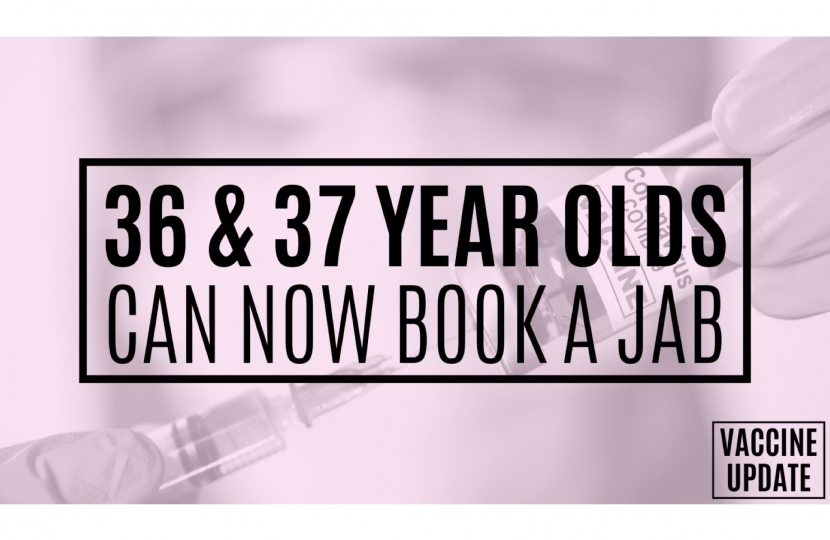
We have administered a total of 56.9 million vaccine doses across the UK, with over 36.7 million people across the UK now having received their first dose and over 20.2 million people having received their second dose. We're making great strides in protecting our country from this virus thanks to the hard work of the NHS staff, volunteers and the British public and we remain on track to offer a first dose to all adults by the end of July.
We are now asking people aged 36 and over and people who'll turn 36 before 1 July 2021 to come forward and get their jab. To book or manage your coronavirus vaccination, please visit: https://www.nhs.uk/conditions/coronavirus-covid-19/coronavirus-vaccination/book-coronavirus-vaccination/.
New Public Health England analysis indicates that the COVID-19 vaccination programme prevented 11,700 deaths in those aged 60 and older in England up to the end of April – an additional 1,300 since the previous update. For the first time, analysis also suggests that at least 33,000 hospitalisations were prevented in those aged 65 and older in England, in the same time period.
New analysis also shows further evidence that the vaccine is highly effective in preventing hospitalisations, especially in older age. Up to the end of April, approximately 3,900 hospital admissions were prevented in those aged 65 to 74, 13,100 in those aged 75 to 84 and 16,000 in those aged 85 and older.
There is now clear and increasing evidence that vaccines help to reduce transmission, therefore it is likely that an even higher number of deaths and hospitalisations have been prevented by the vaccination programme.
Separate analysis indicates that the protection against hospitalisation and death from COVID-19 increases further following the second dose. As more individuals are vaccinated and develop an immune response to the second dose, future analyses will include the impact of the second dose.
Indian (B1.617.2) variant
The Government is closely monitoring the variant first identified in India (B1.617.2) and is taking decisive action along with Public Health England, NHS Test and Trace and local authorities to further control the spread of the COVID-19 B1.617.2 'Indian' variant, after cases began to rapidly emerge in parts of the country. Working in partnership with local authorities, additional measures will be implemented in areas where clusters of cases have been detected to stop further spread and rapidly break chains of transmission. These include:
- enhanced testing and contact tracing, including enhanced community and surge testing in areas defined by the local authorities and regional teams
- increased genome sequencing of positive cases
- increased community engagement, including ensuring that messages are accessible in languages that are used by communities
- working closely with communities and community leaders to ensure that individuals are supported to test and self-isolate
- ensuring access to vaccination in the age and risk groups currently prioritised for vaccination and encouraging uptake
Surge testing involves testing of people who do not have any symptoms of COVID-19. Genomic sequencing means analysing the virus sample to understand how it compares with other cases. Over 4,400 cases and over 14,000 close contacts have been traced and instructed to self-isolate. Colleagues are urged to ensure the public are getting vaccinated when they get the call.
The Health Secretary updated the House of Commons on the B1.617.2 'Indian' variant in the Covid-19 Update yesterday, stating:
“Today, I would like to update the House on the work we are doing to tackle variants of concern—in particular, variant B1617.2, which is the variant of concern first identified in India—so that we can protect the progress that we have worked so hard to achieve. There are now 2,323 confirmed cases of B1617.2 in the UK; 483 of these cases have been seen in Bolton and Blackburn with Darwen, where it is now the dominant strain. Cases there have doubled in the last week and are rising in all age groups. In Blackburn, hospitalisations are stable, with eight people currently in hospital with covid. In Bolton, 19 people are now in hospital with coronavirus, the majority of whom are eligible for a vaccine but have not yet had one. That shows that the new variant is not tending to penetrate into older vaccinated groups, and underlines again the importance of getting the jab—especially, but not only, among the vulnerable age groups.
In Bolton and Blackburn, we have taken the approach that worked in south London against the South African variant. We have surged in our rapid response team: 100 people so far, who visited approximately 35,000 people this weekend to distribute and collect tests. We have installed six new testing units, brought in more than 50 new vaccinators and set up two new vaccination centres, as well as extending opening hours and capacity at our existing sites. In Bolton, we have quadrupled the rate of vaccination. We carried out 6,200 vaccinations over this weekend, and it is brilliant to see so many people from the most vulnerable groups coming forward to get the protection, whether it is their first or second jab.”
To view the full Covid-19 Update debate, please visit: https://hansard.parliament.uk/Commons/2021-05-17/debates/BEC589F3-7FE2-424E-A1ED-4BE5019D4F31/Covid-19Update.
The early evidence suggests that B1617.2 is more transmissible than the previously dominant B1117 variant, however we do not yet know to what extent it is more transmissible. While we do not have the complete picture of the impact of the vaccine, the early laboratory data from Oxford University corroborates the provisional evidence from the Royal Bolton Hospital and the initial observational data from India that vaccines are effective against the variant. This, of course, is reassuring, but the higher transmission poses a real risk.
The Government and its scientific experts are monitoring the evolving situation and rates of variants closely and will not hesitate to take additional action as necessary. As set out in the roadmap, we cannot rule out re-imposing economic and social restrictions at a local or regional level if evidence suggests they are necessary to contain or suppress a variant which escapes the vaccine.
The public is being urged to continue to take up the offer of 2 free rapid tests a week, to help identify asymptomatic cases. Anyone who does test positive should take a follow up PCR test, which can be sent for genome sequencing to help catch new variant cases. The best way for people to protect against the virus is to continue following the public health advice in their area – taking a test, getting their vaccine when asked, and following the rules on hands, face, space and fresh air.
